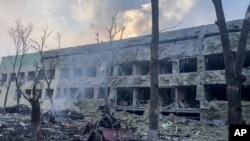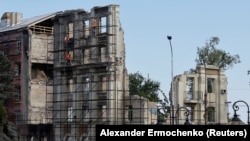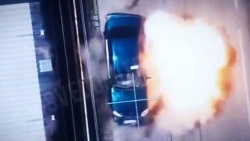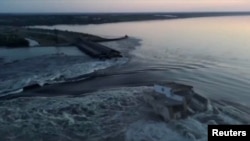In one of his most bellicose and provocative remarks as Russia’s war against Ukraine rages on, President Vladimir Putin said late last month that “where the foot of a Russian soldier steps -- that is ours."
Moscow’s claims in fact go well beyond the land that its soldiers actually control in Ukraine more than 40 months into its full-scale invasion: In September 2022, Putin groundlessly declared that four partially occupied regions of Ukraine -- Kherson, Zaporizhzhya, Donetsk, and Luhansk -- belong to Russia.
In any case, the remark suggested Putin might seek to seize more territory in Ukraine, where Russian soldiers and occupation authorities are accused of seeking to wipe out Ukrainian cultural identity and face allegations of torture, abuse, abduction, and other crimes.
At the same time, Russia is publicly vowing to make life for the residents of the regions it controls better. At a government meeting on June 30, Putin said living standards in the Russian-occupied parts of Ukraine should reach the average level for Russia by 2030.
No way, Ukrainian activists and officials from those regions say.
Putin’s goal may be modest but it’s just not realistic, they argue, citing high hurdles put up by the invading country itself. And they point to the experience of Crimea, where living standards still lag more than 11 years after Russia seized control of the Black Sea peninsula without any of the destruction it has inflicted on mainland Ukraine.
At the meeting last month, Putin spoke of the need to rebuild or renovate schools, stadiums, hospitals, cultural centers, roads, housing, and more, and said that “rhythmic, systematic work” was proceeding on some 300 projects within the development program.
There’s little evidence of that on the ground in the Russian-occupied part of the Kherson region, according to Serhiy Rybalko, a lawmaker in the regional legislature based in the city of Kherson, which was captured by Russian forces early in the invasion but retaken by Ukraine in a counteroffensive later in 2022.
Russia holds most of the land on the left bank of the Dnieper River, which bisects the region, while Ukraine holds the right bank.
“There is no restoration, no construction of schools or anything else,” Rybalko told RFE/RL.
He said the prospects for successful development by the Russian occupiers are not promising, for several reasons, not least of which is the destruction of the massive Kakhovka dam on the Dnieper by an explosion in 2023 that Ukraine blames on Russia.
“Kherson is an agricultural region” and agriculture is currently in “complete decline” there, Rybalko said, adding that the destruction of the dam and the lack of irrigation has severely hampered livestock farming and vegetable growing. “There is no irrigation - this means that this region is very quickly turning into a desert.”
Many farmers leasing land in the Russian-occupied part of the region have been unable to pay for their leases for 2024 and may be unable to do so again this year, he added: “So, nobody will work, no taxes will be paid, and there will be no development of this territory.”
Another barrier to economic revival in the region is the Russian governments tendency to favor state companies and top-down economic efforts over nurturing small and medium-sized business that have been mainstays of the Kherson region in the past, Rybalko said.
“Putin is afraid of the development of the middle class. He fears people who can think for themselves,” he said.
Meanwhile, Ukrainians -- particularly younger people -- are continuing to leave the Russian-occupied left bank lands and “nobody is coming from Russia to replace them, everybody’s afraid,” he said.
“No normal person will come to an area where military actions are essentially taking place,” he said, and where -- though it looks unlikely to happen any time soon -- Ukraine may eventually regain control.
Zaporizhzhya, which lies between Kherson and the Donbas, is another region that is partially Russian-occupied, but Ukraine continues to hold the capital. Its southern reaches, on the Azov Sea coast, are crucial to a Russian-held “land corridor” linking Russia with Crimea, which are otherwise connected only by a bridge that has been attacked by Ukraine several times.
At the June 30 meeting, Putin repeated his claim that the Azov Sea is now an “internal Russia sea” because Russia currently controls all the land that surrounds it and said that 5,400 kilometers of roads forming a ring around it have been renovated.
Andriy Orlov, the director of the Center for the Strategic Development of Territory, a think tank originally based in Melitopol, a Russian-occupied city in the Zaporizhzhya region, said that numbers may be exaggerated and that most of the road improvement has been done in Russia itself or in Crimea, not in the more recently occupied areas.
Orlov said that Putin’s pronouncements were aimed to assure residents that Russia will “create a good life” for them, but that official reports from the occupation authorities make it “clear that there are very big problems” -- rampant corruption and a “glaring personnel deficit” among them, he charged.
Like the other Ukrainians RFE/RL spoke to for this story, he is currently based in Ukrainian-controlled territory. Several claims by Russian and Ukrainian officials could not be independently verified due to a lack of access to the Russian-occupied territories.
Corruption and personnel shortages are also problems in Mariupol, the Azov Sea port in the Donetsk region that Russia seized in May 2022 after a long and deadly siege that left much of the city in ruins.
A medical diagnostic center has been fitted out with modern equipment “but there are not enough doctors -- there’s nobody there to do the diagnoses,” Petro Andryushchenko, a former Mariupol mayoral adviser who now heads the Center for the Study of the Occupation, told RFE/RL.
Renovation of a public swimming pool in Mariupol has been set back by the “theft of all the equipment” that had remained intact after the “ultramodern” facility was damaged during the siege, Andryushchenko said.
Housing is a major problem in Mariupol, a city of some 425,000 before the start of the full-scale invasion in February 2022, with many citizens living in apartment buildings that were damaged or destroyed during the siege.
“There were 2,500 [residential] buildings in total, 500 were demolished, what remains are ruins -- almost all the housing that needs repair, and people still live there,” Andryushchenko said. “And there is also housing that people don’t live in. The reconstruction of these buildings has been frozen.”
Living Standards
Ukrainians point to Crimea as an indicator of whether it Moscow will be able to bolster the economy and boost living standards in the swaths of mainland Ukraine it controls -- assuming that Kyiv does not take them back through war or diplomacy in the coming years.
Russia “earmarked a great deal of money for Crimea…. The occupation authorities said that Crimea would get along without subsidies [from Moscow] after five years, then they said seven years,” Yevhenia Horyunova, a political analyst from the peninsula, told RFE/RL. “But Crimea remains a subsidized region” whose economy “has not become self-sufficient.”
Furthermore, Horyunova said, the average wage in Crimea is substantially lower than the average in Russia. “That is, the standard of living has not improved -- it has not become better than it was.”












